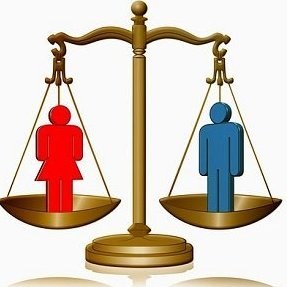
Gender Justice:
As I continue reflecting on the concepts of Justice and Righteousness (or social justice) today, I want to address the topic of Gender Justice or the creation of an equal playing field for male and female members of society. I do not mean to dismiss in any way the gender issues related to the queer community, but my focus today is on the struggle simply to establish both justice and righteousness with regard to the relationships between men and women.
We begin by remembering that Mishpat refers to the form of legal justice that a court or a judge renders and Tzedekah refers to the form of justice that establishes the fair and equitable distribution of goods, services, access, opportunity, etc. among persons within a society.
This said, what we typically see is that legal justice often precedes social justice. Take for example, the right to vote. Our Constitution declared “all men are created equal” and while that term in those times could have referred to all humans…it clearly was not the intent of the framers. What they really meant was, all white, European, land holding men” are created equal…and derivatively should have the right to vote. Neither women, nor persons of African descent, nor slaves were allowed to exercise that right.
Today what we have come to interpret those words to mean is that all people, regardless of gender and race are created equal and therefore should have the right to vote. This conviction has been a process of ‘perfecting’ the union formed by the Constitution. It has been an evolutionary unfolding of that right.
That unfolding has typically followed a process of legal battles, social protests and organizing efforts to secure Mishpat—a legal Supreme Court decision that affirms the expansion of voting rights to include a previously excluded class of persons. Followed by a much slower and even more laborious process of Tzedekah, the application of the court ruling in local jurisdictions, states, counties, cities, etc. A process that often required further social protest, legal challenges and community organizing in arenas where the interest in following the court ordered justice (Mishpat) was not supported by a community’s capacity for social justice (Tzedekah).
Even today, the lack of Righteousness (Tzedekah) in the arena of voting rights is evident by the wrangling of both political parties over the rules and regulations for mail in voting, the gerrymandering of boundaries for congressional districts and the designation of identification documents to access a ballot. We have not yet arrived at a clear and shared understanding of how “one person one vote” should function in our society. It is not a lack of Justice…but a deficiency of Righteousness.
A recent set of articles in the New York Times on gender bias in the US has laid bare yet again how far we have to go in creating the social justice-righteousness that true equity between genders would indicate. Consider some of the issues they raised:
The absence of women in the positions that design our world, from car safety restraints to the number of bathrooms in a concert hall leads to women suffering more injuries in car wrecks to waiting in interminable lines during halftime.
Women not only work their paying jobs for less money than men doing the same job, but then come home to do nearly twice as much unpaid labor in the home. And when those women are black or brown, the differences are even more unjust.
In the arena of healthcare research and treatment, the stark absence of female researchers has led to the ignoring of many women’s health issues. The lack of female participants in research studies has led to erroneous conclusions about how drugs will react to female biology. One doctor at the National Institute for Health put it this way, “We literally know less about every aspect of female biology than male biology”
Perhaps most disturbing is the degree to which women are subject to physical violence at the hands of a domestic partner. In the US 1 out of every 3 women will experience physical abuse in their lifetime at the hands of an intimate partner. For lesbian and bi-sexual women the rates are even higher, 4 in 10 for lesbians and 6 in 10 for bisexual women. That we tolerate this level of violence against women and have not yet corrected it is inexcusable. But, it is perhaps a function of another arena of gender bias/inequality, Political Power.
Even though women were granted the vote by the Mishpat-Justice of the Supreme Court long ago, women still only represent about 25% of elected office holders in the US. Only half their actual number in the population. Our Righteousness-Social Justice has not yet caught up to the hope of the court’s justice.
Undoubtedly, progress has been made, but there is still a long way to go, and the church has not been any better. Leadership in the church, even our Presbyterian Church, was denied to women until very recently. And some branches of the Presbyterian faith still refuse to ordain women to elder or pastoral roles.
In the denominations that became the PCUSA of today, the first female elder was not ordained until Sarah Dickson in 1930, ten years after women were granted the right to vote in the US. The first Presbyterian women clergy were not ordained until Margaret Towner in the ‘northern’ church 1956 and Rachel Henderlight, nine years later in 1965 in the Southern Church. The discriminatory attitude toward women in ministry was clearly in the air as I grew up for I held a strong bias against women church leaders as a teenager. Thankfully I have outgrown that bias!
Rev. Pete Hendrick, a family friend and best buddy of my father in law, Richard Robertson, tells the story about hiring the first female clergy woman in the southern Presbyterian Church while he was the head pastor at FPC Beaumont, TX. Pat McClure was the second woman to be ordained in the PCUS, but the first to receive a call to serve in a local congregation. Pete recalls how one of his elders, Billy Angel, couldn’t accept the change. Every Sunday that Pat was to preach, Billy would get up from his pew and walk out. One Sunday the other women of the church called him out as he was leaving…”Why are you leaving Billy?” He replied, “I have to listen to a woman preach at me 6 days a week, I’m not about to submit to it on Sunday too!”
Mishpat vs. Tzedekah. The legal decision to hire had been made, the national church court battle had been settled, but it would be a very long time before the Billy Angels in local Presbyterian congregations would live out that justice so that it would become righteousness…a shared way of being as a community.
This battle has raged in the church from the very beginning. Recently, the daily newsletter of the Center for Action and Contemplation has been highlighting the overlooked role of Mary Magdalene. The biblical witness to her as a disciple of Jesus reveals her to be the most unswerving of all Christ’s followers, far more courageous and faithful than all the men who had scattered to the wind. Mary of Magdala refused to leave Jesus at the Cross, followed his body to the tomb, watched the stone be placed over the door, showed up at daylight after the sabbath, became the first witness to the resurrection, the first evangelist of this good news and the apostle to the apostles. Why is she never front and center in our Easter story, relegated instead to an interesting sidebar as we focus on Peter, James and John? Her witness is the witness of deep, selfless love.
Then, in the early church’s records we see the house church leadership of Lydia in Ephesus and Priskilla (with her husband Aquila) in the church in Rome. Yet, their clear positions of leadership were diminished if not outrightly obscured by the male translators of scripture (who changed Priskilla’s name to make it masculine!) by the male interpreters of scripture who refused to acknowledge these women’s leadership roles, and by theologians who crafted doctrinal justifications for women to be excluded from leadership.
Only when women began to carve out a role as seminarians, then as pastors, scholars and theologians themselves did the buried treasures of the Christian and biblical traditions of female leadership start to be restored to their proper and Righteous position. One female scholar has even proposed that Priskilla might be the mysterious author of the book of Hebrews!
Clearly, when the Mishpat of court justice begins to be reflected in the Tzedekah of social justice to the degree that women are at the decision making table, in the board room, in the research, in the workplace, on the design team, in the pulpit in numbers that reflect their actual proportion of the population; then we will all see more fully, understand more clearly, make better choices and can become our best selves.
